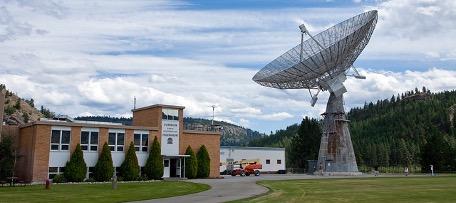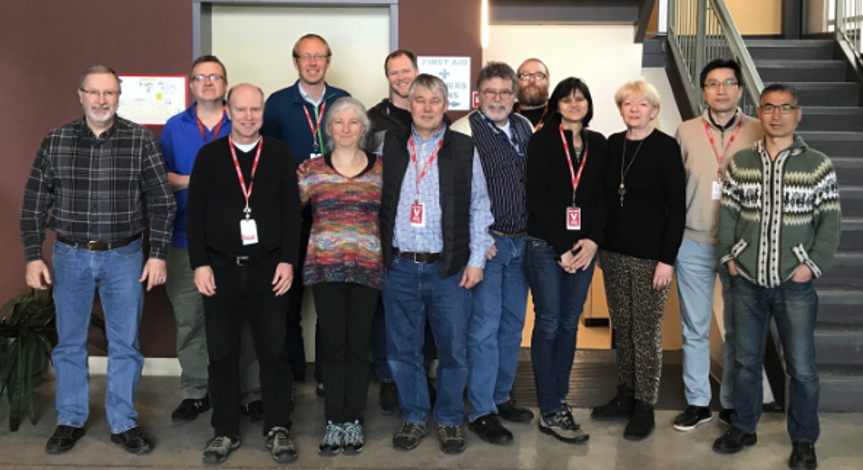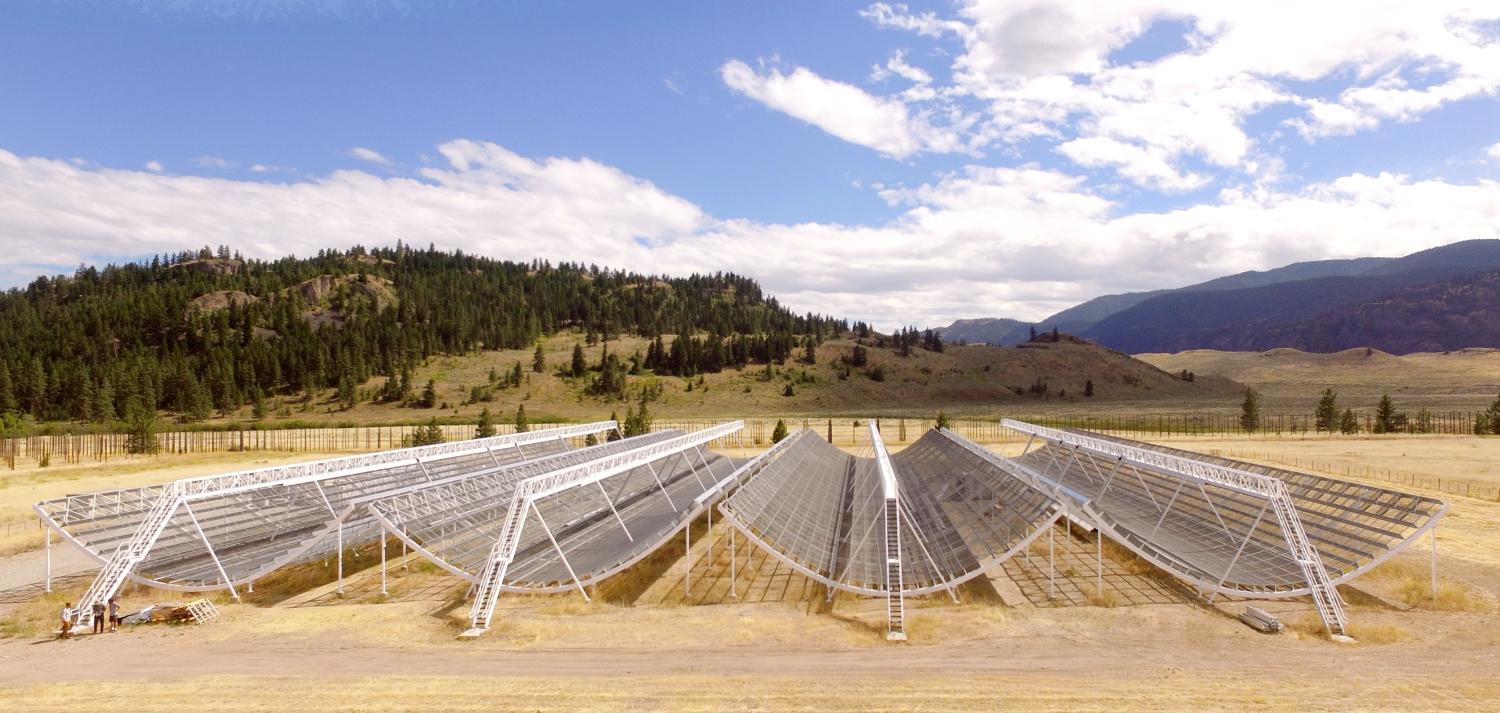Canada

At a glance
- $105m of SKA-related contracts awarded to Canadian industry.
- Canadian astronomers participate in 12 of the 14 SKAO Science Working Groups and two are co-chaired by Canadians.
- The National Research Council of Canada (NRC) represents Canada in the governance of the SKAO and facilitates participation by Canadian academic and industry partners.
- The Canadian SKA Pathfinder is CHIME (Canadian Hydrogen Intensity Mapping Experiment), the world’s leading fast radio burst discovery engine.
National involvement
Canada’s most significant technical contribution is the SKA-Mid Correlator/Beamformer, a powerful data processing engine that will collect and process large volumes of data. MDA Space designed the state-of-the art embedded computing technologies in collaboration with the NRC.
Canada is also responsible for delivering high-performance cryogenic low-noise amplifiers (LNAs) for SKA-Mid’s Band 2 receivers. Radio telescopes need high-quality LNAs to amplify distant astronomical signals. The NRC designed and engineered the LNAs in collaboration with NANOWAVE Technologies Inc.
The NRC and NANOWAVE also developed the LNAs for MeerKAT, an SKA precursor. The NRC designed MeerKAT’s carbon composite subreflectors, a component of the receiver that focuses radio waves collected by the antennas.
Canada will host the only SKA Regional Centre (SRC) in the Americas. To manage the vast quantities of data, the SKAO will be supported by a global network of SKA SRCs, distributed around the world and hosted by member states. The Canadian SRC will provide user data access, support and archive services by building on the Canadian Network for Astronomical Research (CANFAR) science platform, which is maintained by the NRC’s Canadian Astronomical Data Centre (CADC).

Industrial participation
MDA Space was awarded the contract to support the development, construction and integration of the SKA-Mid Correlator/Beamformer. MDA Space is a leading Canadian company specializing in advanced technology solutions for space exploration.
NANOWAVE Technologies Inc. is producing the full complement of Band 2 cryogenic low-noise amplifiers for SKA-Mid. NANOWAVE is a Canadian company based in the province of Ontario, that designs and manufactures radio frequency components and subsystems for the space, aerospace and defence industries.
Canadian contributions are also supporting an agreement between the Digital Research Alliance of Canada and the NRC to expand existing infrastructure to support Canada's SKA Regional Centre (SRC). The Canadian SRC will use CANARIE network services, which is a Canadian high-speed network that connects provinces and territories and global research and education networks.
Raymond EMC, a leading Canadian manufacturer of shielded enclosures and anechoic chambers, provided the anechoic chamber for low-frequency radio testing for SKA-Low – one of the only such facilities in the Southern Hemisphere.
Science interests
Canada’s SKA Science Director is Dr Kristine Spekkens at Queen’s University in Kingston, Ontario. Dr. Spekkens is also the Chair of the SKAO’s Science and Engineering Advisory Committee (SEAC).
Nearly 40 Canadians sit on SKA Science Working Groups (SWGs), with the largest contingents in the very-long-baseline interferometry, transients, magnetism, HI galaxy and extragalactic continuum SWGs. Currently Canadians chair two SWGs in the areas of Epoch of Reionization (Dr. Adrian Liu, McGill University) and magnetism (Dr. Jennifer West, NRC).
Canada’s SKA Pathfinder CHIME is the leading fast radio burst discovery engine in the world. It was awarded the Buchalter Cosmology Prize (2024), the Brockhouse Canada Prize (2022), the Lancelot M. Berkley – New York Community Trust Prize for Meritorious Work in Astronomy (2022), and the Governor General’s Innovation Award (2020). The CHIME project is co-led by the University of British Columbia, McGill University in Quebec, and the University of Toronto in Ontario, with collaborating institutions across North America. It is hosted at the NRC’s Dominion Radio Astrophysical Observatory near Penticton, British Columbia. CHIME has produced more than 180 refereed journal articles, including six papers in Nature and one in Science.
Canada hosted the SKA Science Meeting “New Eyes on the Universe,” which brought over 300 astronomers to Vancouver, British Columbia, in 2023.

Wider impact
The NRC’s Herzberg Astronomy and Astrophysics Research Centre manages the Canadian SKA Scientist Program, which funds top-level postdoctoral researchers from Canada and around the globe. Canadian SKA Scientists benefit from the mentorship of faculty members at Canadian universities and will make wide-ranging contributions to the Canadian SKA initiative, while providing support for the SKA community.
The NRC’s Canadian Astronomy Data Centre and the Digital Research Alliance of Canada (the Alliance) are working to deliver the expansion of the Canadian Advanced Network for Astronomy Research. The NRC and the Alliance, with CANARIE, are also hosting sites across Canada to elevate domestic and international astronomy research, with a specific focus on establishing the Canadian SKA Regional Centre (SRC) to enhance overall research capacity in Canada.
Canada's major technological contributions to the SKAO will have spin-off applications in a variety of sectors such as digital signal and data processing and storage, telecommunications, medical imaging, and emerging quantum sectors.
Contact
- The SKA Office / Bureau SKA (NRC/CNRC) coordinates Canada's involvement in the SKA project.
E-mail: Bureau-SKA-Office@nrc-cnrc.gc.ca




